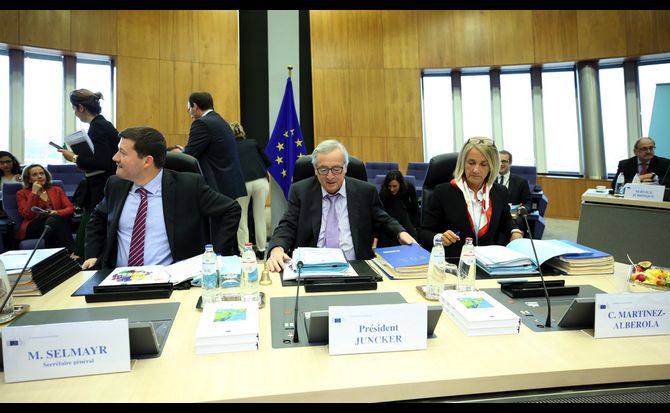EU budget plan offers progress and pitfalls
The European Commission is finally taking steps to trim unproductive spending in areas like agriculture in its budget framework for 2021-2027. But while the new emphasis on fighting waste is promising, the fiscal plan also contains troubling proposals.

The European Commission has proposed its next budgetary framework for 2021-2027. The draft document foresees expenditures of 1.279 billion euros over the seven years, increasing the share of the European Union’s budget to 1.3 percent of the bloc’s Gross National Income (GNI). As the United Kingdom will no longer be paying in, net contributions from the remaining states will increase.
The spending boost drew protests from net contributors such as the Netherlands, Sweden and Austria. The European Parliament, aiming to strengthen its own position, has asked for even more generous funding. But the two largest euro area economies – Germany, the biggest net contributor, along with France, which takes the most from the EU budget’s largest money pot, the Common Agricultural Policy – have not complained.
The EU’s main sources of revenue are contributions from the member states, based on computations of their GNI, followed by customs duties and a small percentage (0.3 percent) of the national governments’ revenue from standardized VAT. Most spending (46 percent) is on agricultural subsidies, followed by cohesion payments (30 percent) to boost infrastructure and business in less developed regions of the bloc. The cohesion program is important because it strengthens the internal market – a core function of the EU.
Economic sense
In economic and trading terms, it makes good sense to reduce the agricultural budget, as the European Commission’s draft framework proposes. Its overall share in EU spending is set to decline to 40 percent. However, the planned cuts are relatively small and the CAP is still oversized. There remains plenty of fat to trim, and the fact that the farm budget has been renamed “Natural Resources” hardly improves the situation.
It also makes sense – as planned – to more closely monitor how efficiently cohesion funds are used, since they help the single market grow. These expenditures have also been grouped into a new category, “Cohesion and Values,” which will now be the largest single spending category in the EU budget. New spending for border control and foreign policy will be shown in a separate position.
The EU budget should remain linked to the Union’s underlying economic and social purpose, not to values.
In recent weeks, German Chancellor Angela Merkel has suggested that the UK’s lost contributions could be offset by reduced cohesion payments to Hungary and Poland. This is also the opinion of French President Emmanuel Macron. Their rationale, shared by others, is that the two countries are betraying “European values.” This dangerous thinking seems to be gaining traction in Brussels.
Why dangerous?
Reducing waste and abuse and making support more efficient are extremely important goals. But they should remain linked to the EU’s underlying economic and social purpose, not to values.
Article 2 of the Lisbon Treaty specifies the following: “The Union is founded on the values of respect for human dignity, freedom, democracy, equality, the rule of law and respect for human rights, including the rights of persons belonging to minorities. These values are common to the Member States in a society in which pluralism, non-discrimination, tolerance, justice, solidarity and equality between women and men prevail.”
Peculiar logic
Starting this values discussion brings manifold problems. The “values” mentioned in the list – important as they are – remain open to interpretation. But what is indefensible is for some European leaders to apply interpretations, while at the same time they themselves flout the rules. For example, France repeatedly extended the state of emergency declared after the November 2015 terrorist attacks, before simply enacting many of its provisions in a new counterterrorism law. Whether it comports with EU values is quite doubtful, since it allows the police to infringe on individual rights in many areas, without a court order or judicial review.
A close reading of Article 2 does not make it obvious that Poland and Hungary are at present violating European values, or that these alleged violations are worse than those of some other member states.
Similar penalties have not been applied to countries that have bent or broken the rules of the internal market.
There are even more striking facets to this logic. Using market measures to enforce value judgments is a very peculiar approach. Not only does this impair the smooth functioning of the single market, but it also infringes on the fundamental European principle of subsidiarity – the basis for the Union.
What makes the proposed treatment even more arbitrary is that similar measures have not been applied to countries that have bent or broken the rules of the internal market, such as mandatory austerity measures or debt limits.
Fortunately, it is not certain Brussels and some Western European governments will be able to impose these value-based penalties. Even so, the debate is distracting Europe from more important matters and betrays a very centralist attitude. The central authorities and a few large countries have usurped the right to interpret EU values and enforce them on the rest of Europe’s sovereign states.
The EU needs to continue its successful internal market policies while respecting the right of its sovereign members to self-determination. Cohesion funds, well spent, are an investment that will strengthen the entire Union – not just the individual recipients.
